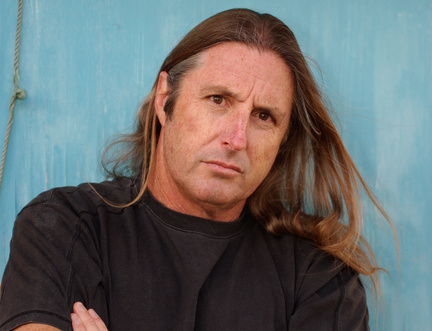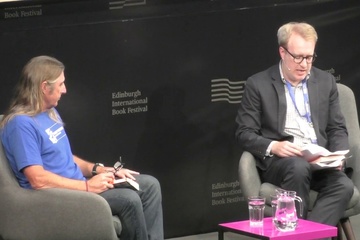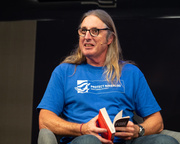More articles Sunday 11 August 2019 3:00pm
Tim Winton: "In order for things to get better, things have to get broken”

“There’s an assumption of hope as a feeling. I see it as a discipline,” says Tim Winton. The renowned Australian author spoke with John Williams, Daily Books Editor at the New York Times, about his latest novel The Shepherd’s Hut at the Edinburgh International Book Festival yesterday.
Discussing the environmental and existential challenges facing the world today, Winton stressed the responsibility to hope which he feels we have. “Some of us search for hope. And even if you’re not a hopeful person, we have an obligation to identify hope rather than assume it’s not available. There’s a kind of courage in that.
“If there’s anything in the world that you love, hope is required. And to manufacture or change the conditions that you face so that hope is plausible is your responsibility. The discipline of hope and optimism is another way of courage.
“When hope is alive it breaks things. In order for things to get better, things have to get broken. Whether that’s happening in our hearts or our polity or our family, in order for things to get better things have to get broken.”
The environment has always been at the forefront of Winton’s numerous acclaimed novels, although he doesn’t consider himself prolific. The Shepherd’s Hut is similarly focused on the landscape of Western Australia, which is unsurprising considering he claims his ideas stem from an image of the place, rather than the story.
“The ecosystem comes first and that provides the terms of trade – the kinds of people who are going to be there, subject to the logic of the place… I see the place almost like the scene from a bad Western movie, shimmering heat across the plain. The character comes out of the place, I find them in that place.”
The troubled teenage boy who emerged as the central character for his latest book was a struggle to write, Winton said. “It was actually quite difficult to write partly because the language is so constrained, and so grim, so relentless, so misogynistic and he’s a racist, so you live with someone like that, inhabit his mind and his dreams and more troublingly, his lexicon, and it bends you out of shape. You’re channelling someone that you’re interested in but appalled by quite a lot… Some of the risk [involved] was of doing damage to myself, and some of it was, I was inhabiting this unpleasant boy at a time when the unpleasantness of men is at the forefront of culture.”
“We are in a world of trouble,” he added, “And the landscapes that I’m writing about, the places that I depend on, that I love as family… these places are in such trouble that we have to fight for them, and if that means taking time off being an artist, then I will instead fight for these places, for the people who are not yet with us.
“A lot of people in arts spaces feel more bound up, there’s not much chance of side stepping this. The point where we are in history has taken us to the brink where you can struggle to see a viable future for your children and your grandchildren. And that takes me to the point where I think, am I a good ancestor? And I think that’s a question that we all have to ask ourselves.”



 Major new partnership with Celtic Connections
Major new partnership with Celtic Connections 

